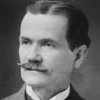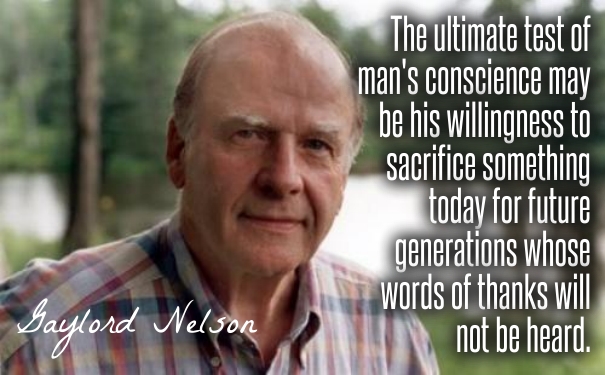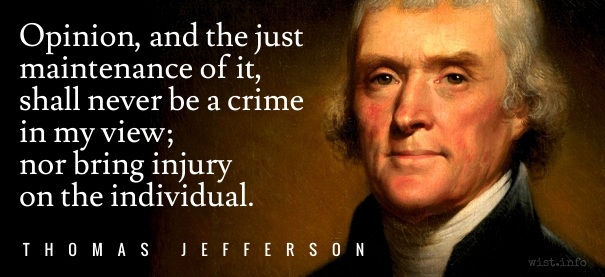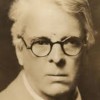Everyone has a confused notion of good,
On which he sets his mind, and which he desires;
And therefore everyone tries to attain it.[Ciascun confusamente un bene apprende
nel qual si queti l’animo, e disira;
per che di giugner lui ciascun contende.]Dante Alighieri (1265-1321) Italian poet
The Divine Comedy [Divina Commedia], Book 2 “Purgatorio,” Canto 17, l. 127ff (17.127-129) [Virgil] (1314) [tr. Sisson (1981)]
(Source)
(Source (Italian)). Alternate translations:
All follow good; but with uncertain aim.
At once it kindles, and it soothes their flame.
[tr. Boyd (1802), st. 32]
All indistinctly apprehend a bliss
On which the soul may rest, the hearts of all
Yearn after it, and to that wished bourn
All therefore strive to tend.
[tr. Cary (1814)]
A good each one confusedly apprehends
The mind to quiet -- satisfy desire;
Hence to attain 't will every one conspire.
[tr. Bannerman (1850)]
Each one confusedly a good conceives
Wherein the mind may rest, and longeth for it;
Therefore to overtake it each one strives.
[tr. Longfellow (1867)]
Each one confusedly apprehends a good wherein his mind may rest, and desires it ; wherefore each one strives to reach Him.
[tr. Butler (1885)]
Some good doth each confusedly apprehend.
In which to rest his spirit's longing fain,
Therefore to reach to it doth each contend.
[tr. Minchin (1885)]
Every one confusedly apprehends a good in which the mind may be at rest, and which it desires; wherefore every one strives to attain it.
[tr. Norton (1892)]
Each one apprehends vaguely a good wherein the mind may find rest, and desires it; wherefore each one strives to attain thereto.
[tr. Okey (1901)]
Everyone confusedly apprehends a good in which the mind may be at rest and desires it, so that each strives to reach it.
[tr. Sinclair (1939)]
Each one confusedly doth apprehend
A longed-for good, wherein the mind may find rest;
And therefore each one strives to attain that end.
[tr. Binyon (1943)]
Everyone vaguely pictures in his mind
A good the heart may rest on, and is driven
By his desire to seek it and to find.
[tr. Sayers (1955)]
All men, though in a vague way, apprehend
a good their souls may rest in, and desire it;
each, therefore, strives to reach his chosen end.
[tr. Ciardi (1961)]
Each one apprehends vaguely a good wherein the mind may find rest, and this it desires' wherefore each one strives to attain thereto.
[tr. Singleton (1973)]
All of you, vaguely, apprehend and crave
a good with which your heart may be at rest;
and so, each of you strives to reach that goal.
[tr. Musa (1981)]
Each apprehends confusedly a Good
in which the mind may rest, and longs for It;
and, thus, all strive to reach that Good.
[tr. Mandelbaum (1982)]
Each confusedly apprehends a Good in which his spirit may be quieted, and desires it, and therefore each strives to reach it.
[tr. Durling (2003)]
Everyone vaguely apprehends a good, where the mind finds rest: and desires it: so everyone labours to attain it.
[tr. Kline (2002)]
We all, confusedly, conceive a good,
desiring that our hearts may rest in that.
And each will strive to make their way to it.
[tr. Kirkpatrick (2007)]
Everyone can vaguely apprehend some good
in which the mind may find its peace.
With desire, each one strives to reach it.
[tr. Hollander/Hollander (2007)]
They muddle about, knowing there is goodness
In which their minds can rest, and they wish to have it,
All of them struggling to find what's so desired.
[tr. Raffel (2010)]
Quotations about:
conscience
Note not all quotations have been tagged, so Search may find additional quotes on this topic.
O clear and noble conscience, how sharply a little fault stings you!
[O dignitosa coscïenza, e netta,
come t’è picciol fallo amaro morso!]Dante Alighieri (1265-1321) Italian poet
The Divine Comedy [Divina Commedia], Book 2 “Purgatorio,” Canto 3, l. 8ff (3.8-9) (1314) [tr. Kline (2002)]
(Source)
Observing his guide, Virgil, upset over one of his own lapses.
(Source (Italian)). Alternate translations:
O matchless dignity of stainless thought!
Thus bitter seems to you the taste of Sin!
[tr. Boyd (1802), st. 2]
O clear conscience and upright
How doth a little sting wound thee sore!
[tr. Cary (1814)]
Oh, dignity of conscience, when complete,
How small will bitter make that once was sweet!
[tr. Bannerman (1850)]
O noble conscience, and without a stain,
How sharp a sting is trivial fault to thee!
[tr. Longfellow (1867)]
O conscience, dignified and pure, how bitter a sting is a small fault to thee!
[tr. Butler (1885)]
O conscience honourably pure, to thee
How is a little fault most bitterly shrived!
[tr. Minchin (1885)]
O conscience, upright and stainless, how bitter a sting to thee is little fault!
[tr. Norton (1892)]
O noble conscience and clear, how sharp a sting gives a little fault to thee!
[tr. Wicksteed (1899)]
O pure and noble conscience, how bitter a sting to thee is a little fault!
[tr. Sinclair (1939)]
O honourable conscience, clear and chaste,
How small a fault stings thee to bitter smart!
[tr. Binyon (1943)]
O noble conscience, clear and undefaced,
How keen thy self-reproach for one small slip!
[tr. Sayers (1955)]
O noble conscience without stain! how sharp
the sting of a small fault is to your sense!
[tr. Ciardi (1961)]
O pure and noble conscience, how bitter
a sting is a little fault to you!
[tr. Singleton (1973)]
O dignity of conscience, noble, chaste,
how one slight fault can sting you into shame!
[tr. Musa (1981)]
O conscience so precious and so clear,
How small a fault is a sharp tooth to you!
[tr. Sisson (1981)]
O pure and noble conscience, you in whom
each petty fault becomes a harsh rebuke!
[tr. Mandelbaum (1982)]
O worthy clear conscience, how bitter a bite to you is even a little fault!
[tr. Durling (2003)]
Such dignity of conscience, clear and clean,
bitten so keenly by so slight a fault!
[tr. Kirkpatrick (2007)]
O pure and noble conscience,
how bitter is the sting of your least fault!
[tr. Hollander/Hollander (2007)]
But O, how purest consciences are stung
By tiny faults, bitter on noble tongues!
[tr. Raffel (2010)]
A Sunday-school is a prison in which children do penance for the evil consciences of their parents.
H. L. Mencken (1880-1956) American writer and journalist [Henry Lewis Mencken]
A Little Book in C Major, ch. 3, § 3 (1916)
(Source)
Variant:
SUNDAY SCHOOL. A prison in which children do penance for the evil conscience of their parents.
A Book of Burlesques, "The Jazz Webster" (1924)
Conscience makes cowards of us all. Politeness is even worse. It makes actors of us.
H. L. Mencken (1880-1956) American writer and journalist [Henry Lewis Mencken]
A Little Book in C Major, ch. 2, § 26 (1916)
(Source)
Not reprinted in later works.
“Let your conscience be your guide” is a silly thing to say to a good man, or a bad one.
Mignon McLaughlin (1913-1983) American journalist and author
The Second Neurotic’s Notebook, ch. 5 (1966)
(Source)
If men knew how to blush at their own actions, how many crimes, and not only those that are hidden, but those that are public and well known, would never be committed!
[Si l’homme savait rougir de soi, quels crimes, non seulement cachés, mais publics et connus, ne s’épargnerait-il pas!]
Jean de La Bruyère (1645-1696) French essayist, moralist
The Characters [Les Caractères], ch. 11 “Of Mankind [De l’Homme],” § 151 (11.151) (1688) [tr. Van Laun (1885)]
(Source)
(Source (French)). Alternate translations:
If men could blush at their own actions, how many sins, publick and private, would they save by it?
[Bullord ed. (1696)]
If Men knew how to blush at their own Actions, how many Crimes, publick and private, would they save by it!
[Curll ed. (1713)]
If Men could blush for themselves, how many Sins, public and private, would they save by it!
[Browne ed. (1752)]
If a man knew how to blush at his own actions, what crimes, not only secret but public and overt, would he not spare himself!
[tr. Stewart (1970)]
Every human being has, like Socrates, an attendant spirit; and wise are they who obey its signals. If it does not always tell us what to do, it always cautions us what not to do.
Lydia Maria Child (1802-1880) American abolitionist, activist, journalist, suffragist
Philothea, ch. 6 [Philothea] (1836)
(Source)
A conscience which has been bought once will be bought twice.
Norbert Wiener (1894-1964) American mathematician and philosopher
The Human Use of Human Beings, ch. 7 (1954)
(Source)
For Justice is one; it binds all human society, and is based on one Law, which is right reason applied to command and prohibition. Whoever knows not this Law, whether it has been recorded in writing anywhere or not, is without Justice.
[Est enim unum ius quo deuincta est hominum societas et quod lex constituit una, quae lex est recta ratio imperandi atque prohibendi. Quam qui ignorat, is est iniustus, siue est illa scripta uspiam siue nusquam.]
Marcus Tullius Cicero (106-43 BC) Roman orator, statesman, philosopher
De Legibus [On the Laws], Book 1, ch. 15 (1.15) / sec. 42 [Marcus] (c. 51 BC) [tr. Keyes (1928)]
(Source)
(Source (Latin)). Alternate translations:
There can be but one essential justice, which cements society, and one law which establishes this justice. This law is right reason, which is the true rule of all commandments and prohibitions. Whoever neglects this law, whether written or unwritten, is necessarily unjust and wicked.
[tr. Barham (1842)]
For there is but one essential justice which cements society, and one law which establishes this justice. This law is right reason, which is the true rule of all commandments and prohibitions. Whoever neglects this law, whether written or unwritten, is necessarily unjust and wicked.
[tr. Barham/Yonge (1878)]
There is one, single, justice. It binds together human society and has been established by one, single, law. That law is right reason in commanding and forbidding. A man who does not acknowledge this law is unjust, whether it has been written down anywhere or not.
[tr. Rudd (1998)]
There is only one justice, which constitutes the bond among humans, and which was established by the one law, which is right reason in commands and prohibitions. The person who does not know it is unjust, whether the law has been written anywhere or not.
[tr. Zetzel (1999)]
Right is uniform; human fellowship has been bound by it, and one law has established it; that law is correct reason in commanding and prohibiting. He who is ignorant of it is unjust, whether it has been written somewhere or nowhere.
[tr. Fott (2013)]
Conscience is a man’s compass, and though the needle sometimes deviates, though one often perceives irregularities in directing one’s course after it, still one must try to follow its direction.
Political loyalty, military obedience are excellent things, but they neither require nor do they justify the commission of patently wicked acts. There comes a point where a man must refuse to answer to his leader if he is also to answer to his conscience.
Hartley Shawcross (1902-2003) English barrister, politician, diplomat
Opening remarks, Nuremberg War Crimes Tribunal (4 Dec 1945)
(Source)
Shawcross was Attorney General of the UK and Chief Prosecutor for the UK at the tribunal
Each man’s soul is a menagerie where Conscience, the animal-tamer, lives with a collection of wild beasts.
Austin O'Malley (1858-1932) American ophthalmologist, professor of literature, aphorist
Keystones of Thought (1914)
(Source)
There is only one way to achieve happiness on this terrestrial ball,
And that is to have either a clear conscience, or none at all.Ogden Nash (1902-1971) American poet
“Inter-Office Memorandum,” I’m a Stranger Here Myself (1938)
(Source)
A poor man defended himself when charged with stealing food to appease the cravings of hunger, saying, the cries of the stomach silenced those of the conscience.
Marguerite Gardiner, Countess of Blessington (1789-1849) Irish novelist [Lady Blessington, b. Margaret Power]
(Attributed)
(Source)
Quoted, without citation, in R. R. Madden, The Literary Life and Correspondence of the Countess of Blessington, Vol. 1 (1855).
A psychologist once said that we know little about the conscience except that it is soluble in alcohol.
Thomas Blackburn (1916-1977) British poet.
“The Contemporary Dream,” The London Review (Jan 1959)
(Source)
Sometimes misattributed to John Mortimer.
Your conscience is the measure of the honesty of your selfishness. Listen to it carefully.
Richard Bach (b. 1936) American writer
Illusions: The Adventures of a Reluctant Messiah, ch. 13, epigraph (1977)
(Source)
A good conscience is to the Soul what health is to the body; it preserves constant ease and serenity within us; and more than countervails all the calamities and afflictions which can befall us from without.
Joseph Addison (1672-1719) English essayist, poet, statesman
The Guardian, #135 (15 Aug 1713)
(Source)
Timely advis’d, the coming Evil shun:
Better not do the Deed, than weep it done.Matthew Prior (1664-1721) English poet and diplomat
“Henry and Emma,” l. 310ff [Henry] (1709)
(Source)
Nay, we have heard it said that there is not a quaker or a baptist, a presbyterian or an episcopalian, a catholic or a protestant in heaven: that, on entering that gate, we leave those badges of schism behind, and find ourselves united in those principles only in which god has united us all. Let us not be uneasy then about the different roads we may pursue, as believing them the shortest, to that our last abode: but, following the guidance of a good conscience, let us be happy in the hope that, by these different paths, we shall all meet in the end. and that you and I may there meet and embrace is my earnest prayer: and with this assurance I salute you with brotherly esteem and respect.
Thomas Jefferson (1743-1826) American political philosopher, polymath, statesman, US President (1801-09)
Letter to Miles King (26 Sep 1814)
(Source)
Where he had "heard it said" might be an 1813 letter from John Adams.
Courage without conscience is a wild beast.
Robert Green Ingersoll (1833-1899) American lawyer, agnostic, orator
Decoration Day Speech, Academy of Music, New York City (29 May 1882)
(Source)
Cherish what you believe. Don’t job off one single value judgment because it swims upstream against what appears to be a majority. Respect your own logic, your own sense of morality. Death and taxes may be the only absolutes. It’s for you to conjure up the modus operandi of how you live, act, react and hammer out a code of ethics. Certainly listen to arguments; certainly ponder and respect the opinions of your peers. But there’s a point you compromise, and there’s a point all human beings draw a line and say, “Beyond this point it’s not right or just or honest, and beyond this point I don’t move.”
Rod Serling (1924-1975) American screenwriter, playwright, television producer, narrator
Commencement Address, Ithaca College, New York (13 May 1972)
(Source)
[The first principle of British democracy is] our prime duty to each other and to what our conscience tells us to be right. If this leads individuals into conflict with the law, those individuals must be ready to take the consequences non-violently. In our democracy no man should tell another man to break the law, nor should any man break the law to by-pass Parliament. But a person who is punished for breaking an unjust law may if he is sincere and his cause wins public sympathy, create a public demand to have that unjust law changed through Parliament. This is the first and most fundamental principle of British democracy. It has a deep moral significance. Our religious and political liberties rest upon it.
Shame is not of his soul; nor understood,
The greatest evil and the greatest good.[οὐδέ οἱ αἰδὼς
γίγνεται, ἥ τ᾽ ἄνδρας μέγα σίνεται ἠδ᾽ ὀνίνησι.]Homer (fl. 7th-8th C. BC) Greek author
The Iliad [Ἰλιάς], Book 24, l. 44ff (24.44) [Apollo] (c. 750 BC) [tr. Pope (1715-20)]
(Source)
Speaking of Achilles' mistreatment of Hector's corpse. Pope footnotes: "This is obscure. The original is, 'He has no shame, shame which harms men much, and profits them much.' Dr. Leat, following an ancient critic, thinks the passage an interpolation."
Alternate translations:
And shame, a quality
Of so much weight, that both it helps and hurts excessively
Men in their manners, is not known, nor hath the pow’r to be,
In this man’s being.
[tr. Chapman (1611), l. 47ff]
Shame, man’s blessing or his curse.
[tr. Cowper (1791), l. 58]
Cowper footnotes: "His blessing, if he is properly influenced by it; his curse in its consequences if he is deaf to its dictates."
Nor in him is there sense of shame, which greatly hurts and profits men.
[tr. Buckley (1860)]
Conscience, arbiter of good and ill.
[tr. Derby (1864)]
Neither hath he shame, that doth both harm and profit men greatly.
[tr. Leaf/Lang/Myers (1891)]
That conscience which at once so greatly banes yet greatly boons him that will heed it.
[tr. Butler (1898)]
Neither is shame in his heart, the which harmeth men greatly and profiteth them withal.
[tr. Murray (1924)]
There is not in him any shame; which does much harm to men but profits them also.
[tr. Lattimore (1951)]
He has no shame -- that gift that hinders mortals but helps them, too.
[tr. Fitzgerald (1974)]
No shame in the man,
shame that does great harm or drives men on to good.
[tr. Fagles (1990), l. 52ff]
Shame and respect no
longer he has, which harm men greatly but profit them also.
[tr. Merrill (2007)]
What have I always believed? That on the whole, and by and large, if a man lived properly, not according to what any priests said, but according to what seemed decent and honest inside, then it would, at the end, more or less, turn out all right.
What is betrayal? They talk of a man betraying his country, his friends, his sweetheart. There must be a moral bond first. All a man can betray is his conscience.
Joseph Conrad (1857-1924) Polish-English novelist [b. Teodor Josef Konrad Korzeniowski]
Under Western Eyes, Part 1, ch. 2 (1911)
(Source)
I did not hate them: I was indifferent to them. My crime was far worse because I was not an anti-Semite. … My conscience was progressively calloused and blunted. Of course, one’s conscience does not just cease to exist overnight; it is slowly eroded over the years, eaten away day by day, anesthetized by a multiplicity of little crimes. … As the Nazi environment enveloped us, its evils grew invisible — because we were part of them.
Albert Speer 1905-1981) German architect, government official, author, war criminal
Interview by Eric Norden, Playboy (Jun 1971)
(Source)
And just as the law in civilized countries assumes that the voice of conscience tells everybody, “Thou shalt not kill,” even though man’s natural desires and inclinations may at times be murderous, so the law of Hitler’s land demanded that the voice of conscience tell everybody: “Thou shalt kill,” although the organizers of the massacres knew full well that murder is against the normal desires and inclinations of most people. Evil in the Third Reich had lost the quality by which most people recognize it — the quality of temptation.
Hannah Arendt (1906-1975) German-American philosopher, political theorist
Eichmann in Jerusalem: A Report on the Banality of Evil, ch. 8 (1963)
(Source)
Certainly, if I am obliged to bring religion in to after-dinner toasts, (which indeed does not seem quite the thing) I shall drink — to the Pope, if you please, — still, to Conscience first, and to the Pope afterwards.
John Henry Newman (1801-1890) English prelate, Catholic Cardinal, theologian
Reply to Mr. Gladstone’s Pamphlet [Letter to the Duke of Norfolk], sec. 5 “Conscience” (1875)
(Source)
It is worse than useless to try to put down by law a practice which a very large number of people believes to be innocent, and which must be left to the taste and conscience of the individual.
William Ralph Inge (1860-1954) English prelate [Dean Inge]
“The Birth-Rate” (1917), Outspoken Essays: First Series (1919)
(Source)
Speaking of birth control.
A strong man must be militant as well as moderate. He must be a realist as well as an idealist. If I am to merit the trust invested in me by some of my race, I must be both of these things. This is why nonviolence is a powerful as well as a just weapon. If you confront a man who has long been cruelly misusing you, and say, “Punish me, if you will; I do not deserve it, but I will accept it, so that the world will know I am right and you are wrong,” then you wield a powerful and a just weapon. This man, your oppressor, is automatically morally defeated, and if he has any conscience, he is ashamed. Wherever this weapon is used in a manner that stirs a community’s, or a nation’s, anguished conscience, then the pressure of public opinion becomes an ally in your just cause.
Martin Luther King, Jr. (1929-1968) American clergyman, civil rights leader, social activist, preacher
Playboy interview (Jan 1965)
(Source)
Agitation is the marshalling of the conscience of a nation to mold its laws.
Robert Peel (1788-1850) British statesman, Prime Minister (1834-35, 1841-46)
(Attributed)
(Source)
Sometimes quoted as "conscience of a people." Widely quoted without source in the late 19th Century (earliest ref. 1881).
There are three possible ways in which the church can act toward the state: in the first place, as has been said, it can ask the state whether its actions are legitimate and in accordance with its character as state, i.e., it can throw the state back on its responsibilities. Secondly, it can aid the victims of state action. The church has an unconditional obligation to the victims of any ordering society, even if they do not belong to the Christian community. “Do good to all men.” In both these course of action, the church serves the free state in its free way, and at times when laws are changed the church may in no way withdraw itself from these two tasks.
The third possibility is not just to bandage the victims under the wheel, but to put a spoke in the wheel itself. Such action would be direct political action, and is only possible and required when the church sees the state fail in its function of creating law and order, i.e., when it sees the state unrestrainedly bring about too much or too little law and order.
Dietrich Bonhoeffer (1906-1945) German Lutheran pastor, theologian, martyr
“The Church and the Jewish Question” (1933)
(Source)
On the need for Christian clergy to actively oppose the Nazi regime's persecution of Jews.
We will match your capacity to inflict suffering by our capacity to endure suffering. We will meet your physical force with soul force. Do to us what you will, and we will still love you. We cannot in all good conscience obey your unjust laws because non-cooperation with evil is as much a moral obligation as is cooperation with good. And so put us in jail, and we will go in with humble smiles on our faces, still loving you. Bomb our homes and threaten our children, and we will still love you. Send your propaganda agents around the country and make it appear that we are not fit morally, culturally, and otherwise for integration. And we will still love you. Send your hooded perpetrators of violence into our communities at the midnight hours, and drag us out on some wayside road and beat us and leave us half dead, and we will still love you. But be assured that we will wear you down by our capacity to suffer.
And one day we will win our freedom, but not only will we win freedom for ourselves, we will so appeal to your heart and conscience that we will win you in the process. And our victory will be a double victory.
Martin Luther King, Jr. (1929-1968) American clergyman, civil rights leader, social activist, preacher
“Loving Your Enemies,” sermon, Detroit Council of Churches Noon Lenten Services (1961-03-07)
(Source)
Reprinted in edited form in King, Strength to Love, ch. 5 "Loving Your Enemies," sec. 2 (1963). In the preface he notes this sermon was originally written while in jail in Georgia.
See Gandhi.
No man ever stood the lower in my estimation for having a patch in his clothes; yet I am sure that there is greater anxiety, commonly, to have fashionable, or at least clean and unpatched clothes, than to have a sound conscience.
The fact that the stupid person is often stubborn must not blind us to the fact that he is not independent. In conversation with him, one virtually feels that one is dealing not at all with him as a person, but with slogans, catchwords, and the like that have taken possession of him. He is under a spell, blinded, misused, and abused in his very being. Having thus become a mindless tool, the stupid person will also be capable of any evil and at the same time incapable of seeing that it is evil. This is where the danger of diabolical misuse lurks, for it is this that can once and for all destroy human beings.
Dietrich Bonhoeffer (1906-1945) German Lutheran pastor, theologian, martyr
“On Stupidity” (1942)
(Source)
The only guide to a man is his conscience, the only shield to his memory is the rectitude and the sincerity of his actions. It is very imprudent to walk through life without this shield, because we are so often mocked by the failure of our hopes and the upsetting of our calculations; but with this shield, however the fates may play, we march always in the ranks of honour.
The ultimate test of man’s conscience may be his willingness to sacrifice something today for future generations whose words of thanks will not be heard.
Gaylord Nelson (1916-2005) American politician and environmentalist
“Ah, Wilderness! Save It,” New York Times (4 Sep 1984)
(Source)
Our Passions, Ambition, Avarice, Love, Resentment &c possess so much metaphysical Subtilty and so much overpowering Eloquence, that they insinuate themselves into the Understanding and the Conscience and convert both to their Party. And I may be deceived as much as any of them, when I Say, that Power must never be trusted without a Check.
John Adams (1735-1826) American lawyer, Founding Father, statesman, US President (1797-1801)
Letter to Thomas Jefferson (2 Feb 1816)
(Source)
But opinion, & the just maintenance of it shall never be a crime in my view; nor bring injury on the individual
Thomas Jefferson (1743-1826) American political philosopher, polymath, statesman, US President (1801-09)
Letter to Samuel Adams (29 Mar 1801)
(Source)
Sometimes misattributed to George Washington.
The voice of conscience is so delicate that it is easy to stifle it; but it is also so clear that it is impossible to mistake it.
Germaine de Staël (1766-1817) Swiss-French writer, woman of letters, critic, salonist [Anne Louise Germaine de Staël-Holstein, Madame de Staël, Madame Necker]
Germany [De l’Allemagne], Part 3, ch. 13 (1813)
(Source)
The Bible is a sealed book to him who has not first heard its laws from his soul.
Ralph Waldo Emerson (1803-1882) American essayist, lecturer, poet
“Trust Yourself,” Sermon 90 (1830)
(Source)
Sermon on Matthew 16:26.
The man that blushes is not quite a brute.
Edward Young (1683-1765) English poet
The Complaint: Or, Night Thoughts, Vol. 2, No. 7 “Night the Seventh: The Infidel Reclaimed,” l. 496 (1744-07) (1748)
(Source)
General, your tank
is a powerful vehicle
it smashes down forests
and crushes a hundred men.
but it has one defect:
it needs a driver.
The Lord created us in His image and likeness, and we are the image of the Lord, and He does good and all of us have this commandment at heart: do good and do not do evil. All of us. “But, Father, this is not Catholic! He cannot do good.” Yes, he can. He must. Not can: must! Because he has this commandment within him. Instead, this “closing off” that imagines that those outside, everyone, cannot do good is a wall that leads to war and also to what some people throughout history have conceived of: killing in the name of God. That we can kill in the name of God. And that, simply, is blasphemy. To say that you can kill in the name of God is blasphemy.
Francis I (b. 1936) Argentinian Catholic Pope (2013- ) [b. Jorge Mario Bergoglio]
Homily (22 May 2013)
(Source)
Things said or done long years ago,
Or things I did not do or say
But thought that I might say or do,
Weigh me down, and not a day
But something is recalled,
My conscience or my vanity appalled.William Butler Yeats (1865-1939) Irish poet and dramatist
“Vacillation,” st. 4 (1932), The Winding Stair and Other Poems (1933)
(Source)

















































